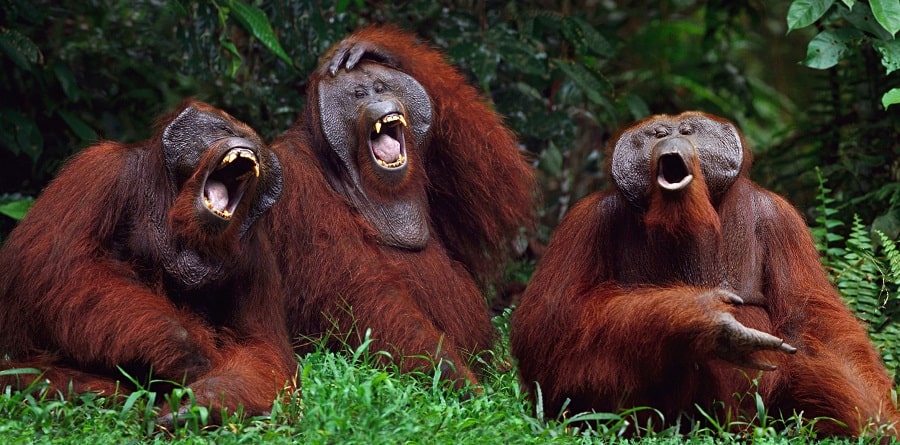Animals that can laugh

It’s not just humans who can laugh. There are many animals that laugh a lot. Sixty-five species of animals make laughter-like sounds.
Monkeys
Female chimpanzees tickle the males during mating rituals, and their cubs. Monkeys respond to tickling by producing gurgling, gurgling laughter. Gorillas also like to giggle.
Rats, dogs, horses and others
Rats, too, may laugh when tickled. But their laughter is high-pitched, so the human ear simply can’t pick it up. Rats have a department in their brains that is responsible for laughter. If this area is electrically stimulated, the rodent laughs, even without being tickled.
Dogs often smile. Horses start to roar loudly if they are brushed in the armpit area. Camels, owls and penguins react to tickling.
Cows, foxes, mongooses and seals can laugh. Dolphins have an excellent sense of humor, which often prank their congeners and understand the meaning of comic situations. But dolphins always look as if smiling, so it is difficult to understand whether he is laughing at the moment or not.
Parrots
In every flock of parrots, there is usually one bird that takes on the role of the clown — pretending to stumble or fall just to make the others react. This playful behaviour isn’t just amusing; it highlights how intelligent and social these birds truly are. Parrots often engage in light-hearted tricks, tease each other, and even imitate sounds to draw attention. Scientists believe such antics strengthen social bonds within the flock, helping the birds build trust and cooperation. Their ability to mimic, communicate, and express emotion shows that humour exists even in the animal world. Watching them interact reminds us that laughter, curiosity, and the joy of play are not uniquely human — they are part of the natural rhythm of life.

Thrushes
The thrush family puts on an act if they sense danger. If a cat about to ravage a nest, the male starts shouting loudly and flies low over the female hunter. The female pretends to be wounded and starts jumping in front of the cat. The predator starts chasing the female.
When the birds lead the cat away from the nest to a safe distance, they fly away. A loud bird’s laughter can be heard in the process.
Animals that never laugh
There are many animals that are completely unemotional. For example, crocodiles, which often shed tears, do not feel any emotion. Because tears are a way of eliminating excess salt from the body.
Predators of the feline family rarely show vivid emotions that can be compared to human laughter or tears. Perhaps feline dignity prevents them from laughing.
Why do animals need laughter?
The benefits of laughter for humans have been proven by various studies. But why do animals need a sense of humour, why do they laugh? There is no definite answer as to the practical benefits of laughter and smiling for animals. Scientists continue to study animals’ sense of humour. Some researchers believe that animals use laughter in the same way that humans do. They let their congeners know they are having fun, inviting them to join in the fun. Animals often play actively, but from the outside it looks like a fight. By letting out a laugh, they show that all is well, no one is in danger.
